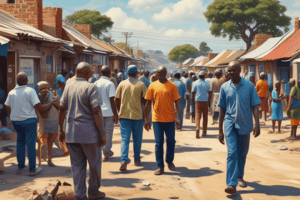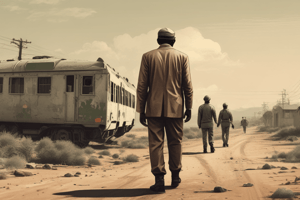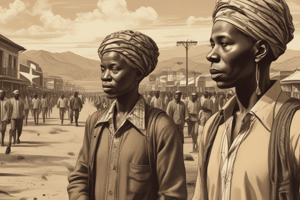Podcast
Questions and Answers
What was the main reason that Whites maintained political dominance in South Africa during apartheid?
What was the main reason that Whites maintained political dominance in South Africa during apartheid?
- They were backed by international support.
- They had a larger population than any other group.
- Only Whites were allowed to vote and hold office. (correct)
- They were considered more educated than other racial groups.
Which statement best describes the living conditions of Coloured communities under apartheid?
Which statement best describes the living conditions of Coloured communities under apartheid?
- They were able to work in skilled professions without restrictions.
- They lived freely without any regulations concerning where they could live.
- They were granted full civil rights similar to Whites.
- They were forced into segregated areas and had limited access to services. (correct)
What role did Mahatma Gandhi play in the context of Indian people in South Africa?
What role did Mahatma Gandhi play in the context of Indian people in South Africa?
- He promoted the idea of complete racial separation.
- He sought to resist injustices through civil disobedience. (correct)
- He encouraged Indians to leave South Africa for other countries.
- He advocated for Indians to integrate with the White population.
How were Coloureds classified under apartheid laws?
How were Coloureds classified under apartheid laws?
What was the historical origin of Indian communities in South Africa?
What was the historical origin of Indian communities in South Africa?
What percentage of land were Africans restricted to under the 1913 Natives Land Act?
What percentage of land were Africans restricted to under the 1913 Natives Land Act?
Which laws required Africans to carry passes to live or work in urban areas?
Which laws required Africans to carry passes to live or work in urban areas?
Which organization was founded in 1912 to fight for African rights?
Which organization was founded in 1912 to fight for African rights?
What was the primary goal of missionary schools during the colonial period?
What was the primary goal of missionary schools during the colonial period?
What term refers to the overcrowded and impoverished areas designated for Africans under apartheid?
What term refers to the overcrowded and impoverished areas designated for Africans under apartheid?
Which group developed their own language and a distinct identity after losing the Anglo-Boer War?
Which group developed their own language and a distinct identity after losing the Anglo-Boer War?
What education system was introduced in 1953 that provided inferior education to limit African advancement?
What education system was introduced in 1953 that provided inferior education to limit African advancement?
Which of the following statements is true about the lives of whites in South Africa during apartheid?
Which of the following statements is true about the lives of whites in South Africa during apartheid?
Flashcards
Afrikaans
Afrikaans
A language spoken by Afrikaners, derived from Dutch, and used as a tool for cultural and political power during apartheid.
Coloured People
Coloured People
Mixed-race people in South Africa, who were descendants of Europeans, slaves, and indigenous peoples. They faced discrimination under apartheid but were often treated better than Africans.
Apartheid
Apartheid
A policy of racial segregation and discrimination in South Africa, which was implemented from 1948 onwards.
Indian People
Indian People
Signup and view all the flashcards
Boer
Boer
Signup and view all the flashcards
Land Dispossession in Apartheid South Africa
Land Dispossession in Apartheid South Africa
Signup and view all the flashcards
Political Oppression under Apartheid
Political Oppression under Apartheid
Signup and view all the flashcards
Pass Laws in Apartheid
Pass Laws in Apartheid
Signup and view all the flashcards
Social Segregation under Apartheid
Social Segregation under Apartheid
Signup and view all the flashcards
Cultural Suppression under Apartheid
Cultural Suppression under Apartheid
Signup and view all the flashcards
African Resistance to Apartheid
African Resistance to Apartheid
Signup and view all the flashcards
Afrikaner Identity and Politics
Afrikaner Identity and Politics
Signup and view all the flashcards
English-Speaking Whites under Apartheid
English-Speaking Whites under Apartheid
Signup and view all the flashcards
Study Notes
Life in Apartheid South Africa
- African Oppression: Africans faced extreme marginalization under both colonial and apartheid rule.
- Economic Dispossession: The 1913 Natives Land Act and later apartheid laws restricted Africans to only 7% (later 13%) of South African land, creating overcrowded and impoverished "Bantustans" or homelands. Africans were forced into exploitative labor systems, like migrant labor, on white-owned farms, mines, and industries.
- Social and Political Oppression: Africans were denied political representation and the right to vote, subjected to discriminatory pass laws limiting their movement, and confined to segregated townships with poor living conditions and limited access to resources.
- Cultural Suppression: African cultures and languages were undermined, and Bantu Education (1953) provided inferior education to limit African advancement.
- Resistance Movements: The African National Congress (ANC), established in 1912, and leaders like Nelson Mandela emerged as central figures in the resistance against apartheid. Events like the Sharpeville Massacre (1960) and the Soweto Uprising (1976) exemplified the growing resistance.
White Life in Apartheid South Africa
- Privilege and Wealth: Whites enjoyed significant economic privilege, controlling land, industries, and wealth. Their lives were characterized by access to well-developed cities, superior education, healthcare, and housing.
- Political Dominance: Whites held exclusive political power, controlling the government and voting rights.
- Internal Diversity: White society wasn't homogenous; distinct groups like Afrikaners and English-speaking whites existed, each with differing economic and political interests.
- Afrikaner Identity: Afrikaners, descendants of Dutch settlers, formed a unique identity, developed the language Afrikaans, and saw their political power rise when the National Party came to power and implemented apartheid in 1948. Their Calvinist beliefs influenced their justifications for segregation.
- English-Speaking Whites: Descendants of British settlers dominated key industries and often maintained closer ties with the British Empire, though they supported white supremacy to maintain their privilege.
Coloured and Indian Experiences
- Coloured Experiences: Mixed-race Coloured people resided primarily in the Western Cape and often spoke Afrikaans. They faced segregation laws under apartheid with access to fewer opportunities than Whites, but slightly better than Africans.
- Coloured Living Conditions: Forced into segregated areas under laws like the Group Areas Act (1950), Coloureds were primarily laborers.
- Indian Experiences: Brought to South Africa as indentured laborers, Indians eventually formed a class of merchants and professionals. They faced discrimination, facing segregation under laws impacting schools, housing, and businesses. Mahatma Gandhi's resistance during his stay in South Africa (1893-1914) was notable.
- Intermediate Status: Coloureds and Indians were discriminated against but sometimes utilized by the apartheid government to create division within non-white South Africans.
Key Terms
- Boer: Refers to Afrikaner farmers descended from Dutch settlers, significant in South African history, often in conflict.
- Afrikaans: A language stemming from Dutch, connected to a distinct Afrikaner identity and used politically during apartheid.
Studying That Suits You
Use AI to generate personalized quizzes and flashcards to suit your learning preferences.




